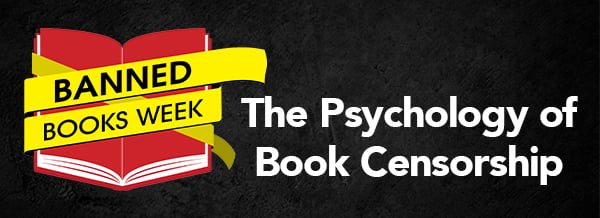Banned Book Week: The Psychology of Book Censorship


Banned Book Week, which originated in 1982, emphasizes the value of free access to information and helps unify all readers in the “shared support of the freedom to seek and express ideas”. Throughout the week, teachers, educators, librarians, and other supporters of literature help expose the dangers of censorship and restrictions to books. When we observe Banned Book Week, it’s important that we think critically about the motivations behind banning particular literature . Although book censorship appears on the surface as a simple act of removal, it is deeply rooted in the human psyche .
Understanding the psychology behind wanting to ban books can help address censorship issues more effectively. Let’s unpack some of these motivations.
-
Fear of the Unknown: We, as humans, inherently fear what we don't understand. The new, unfamiliar, or challenging ideas presented in books can provoke anxiety or a sense of uneasiness, leading to calls for bans. This is especially true for topics that are taboo or not commonly discussed in specific geographies, cultures, or societies.
-
Desire to Protect: One of the most cited reasons for banning books is the protection of young minds. Parents and educators might feel specific content is inappropriate for children or adolescents, believing exposure could lead to harm or misguidance.
-
Preservation of Societal Norms: Books can challenge the status quo, question societal norms, or present alternative ways of thinking. Some individuals or groups might feel threatened by this, believing that these books could disrupt the fabric of society.
-
Control of Narrative: Throughout history, censorship has been used to control narratives and maintain power . Suppressing dissenting voices or alternative views ensures a singular narrative, making controlling public perception and opinion easier.
-
Avoidance of Cognitive Dissonance: Cognitive dissonance is the mental discomfort experienced by a person with contradictory beliefs, values, or attitudes. Books that challenge an individual's deeply held beliefs can evoke this discomfort, leading them to prefer removing such literature rather than confronting conflicting ideas or biases.
-
Preventing Perceived Harm: Some believe certain books can incite violence, hatred, or harmful actions. This fear could motivate advocating for removing or banning such literature to prevent potential harm.
The desire to ban books is a complex issue, deeply entwined with human psychology. While it's important to understand and empathize when the reasons behind wanting to censor literature are sincere, it's necessary to advocate for the freedom to read .
Exposure to diverse thoughts, beliefs, and experiences through literature can foster understanding, empathy , and a more inclusive society. This Banned Book Week, let's champion the right to explore a world of ideas, even those we might disagree with, and celebrate the ever-expanding literature that reflects the human experience in all its shades. Let’s confront fears, expand our tolerance, and increase the dialogue to recognize the root causes of book bans.










